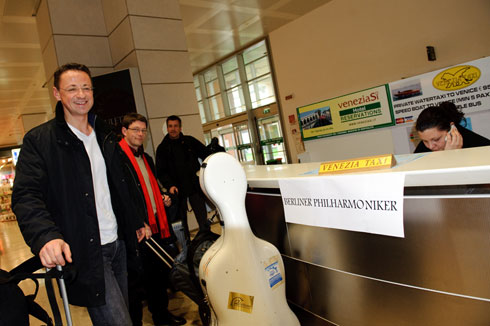Symbol and Practice, or the Indispensable
Jerusalem, the visionary city of a free humankind. Twelve cellists are members of the Berlin Philharmonic - the number has its hidden meanings, but this bare, myth-free statistic, however, also poses many practical difficulties, calling for ingenuity. For when the Twelve is involved in its own activities, the rest of the orchestra can simply pack up, unless wind music is scheduled, which is seldom the case. There is certainly an orchestra literature without violins, but virtually no works without cellos. No matter how one looks at the matter, the cellos have a key function to play: they are simply indispensable. Their appearances as a group are thus possible only during orchestra vacations, when neither concerts, recording sessions, nor rehearsals appear on the calendar.
Their concerts must therefore be planned well in advance, as must recording sessions, while rehearsals can be altered in the short term. The Twelve are thus always obliged to include a special clause in their contracts, of a type usual only with reference to acts of God: they are only available with the approval of the entire Philharmonic, since service in the orchestra takes precedence over side activities - however exclusive and image-building these may be. While there have been no serious conflicts in the history of the Twelve, there have been a few ticklish situations, a number of which have entered into the orchestra's collection of anecdotes.
When, for example, an act of God in the form of a heavenly weather service put the plans of the Philharmonic's cellists very much on ice, the greatest organizational creativity was called for. It was the first Sunday in December 1986, the day on which a hailstorm arrived. The Cathedral in Frankfurt am Main was the agreed upon setting for a benefit concert under the sponsorship of then mayor Walter Wallmann. Everything had been perfectly organized. The trip was to have been by airplane, while the return had to be with the night train, for on the following morning there was a rehearsal under Herbert von Karajan. The train, the only one in that era of the divided Germany, left nightly at 10:30 PM, and there was little time to spare, so timing was professionally meticulous. In late afternoon, however, the hail began to fall in Berlin. It scrubbed the town, at least in terms of traffic and transport, spick and span. All flights from Berlin were canceled. What was to be done?

In this case, the only help to be had was through the clever cooperation between international and personal connections. A Pan Am pilot, a friend of one of the Twelve Cellists, achieved the virtually impossible: permission to take off in a machine which he personally flew to Frankfurt, with the musicians on board. The announced commencement of the concert was no longer possible when permission to land in Frankfurt was given. And this too was achieved only with the greatest effort, since heavy fog hung over the metropolis on the River Main: most flights were re-routed to Stuttgart. The pilot, however, found a fortunate opening and landed safely.
Ten of the Twelve quickly left the airport for a hurried trip to the cathedral. The other two waited for them there, informing a by now fascinated and excited public of the location of the others. When they finally entered, they were greeted with a burst of applause, and when they concluded their necessarily abbreviated program, they were bid good-bye just as enthusiastically. This applause was intended, as usual, for their artistic prowess - but in this case, for their organizational performance as well.




